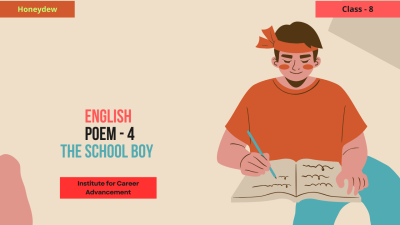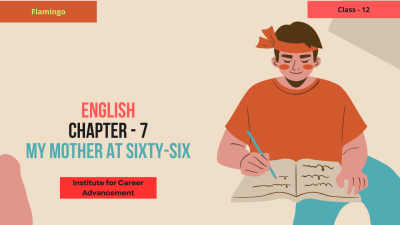Course description
The School Boy - Class 8
Author: William Blake
The School Boy is a poem by the famous English poet William Blake. It is part of his collection of poems titled Songs of Experience, which presents a critical view of the conditions in society. In this poem, Blake reflects on the negative effects of formal schooling on children and contrasts the freedom and joy of nature with the oppressive nature of the education system. The poem presents the experiences of a schoolboy who feels trapped and unhappy in the school environment, longing for the freedom to play and explore the natural world.
Summary of the Poem
In The School Boy, the young narrator describes the feeling of being forced to go to school during the summer, a time when he would rather be outside enjoying the beauty of nature. He compares the natural world, full of freedom, joy, and life, to the oppressive and restrictive atmosphere of the classroom. The poet uses imagery of birds, gardens, and the sunshine to highlight the contrast between the freedom of nature and the confinement of the school. The schoolboy feels that the constraints of school rob him of his happiness, energy, and imagination, which are much better spent in the natural world. He believes that the joy and natural curiosity of children are suppressed by the rigid school system.
The poet critiques the rigid, formal education system, suggesting that it stifles creativity and joy, and that children should be allowed to grow and learn freely, in harmony with nature.
Key Themes
The Oppressiveness of the School System: The poem critiques the formal education system of Blake’s time, which he believes restricts children’s natural joy and stifles their creativity and imagination.
Freedom vs. Confinement: There is a clear contrast between the freedom of nature (the outdoor world) and the confinement of the school (the classroom), which the poet portrays as being lifeless and unappealing.
The Joy of Nature: The poem celebrates the freedom, vitality, and joy found in the natural world, contrasting it with the boredom and restrictions of the school environment.
Loss of Innocence: The schoolboy’s unhappiness can be seen as a metaphor for the loss of innocence that occurs when children are forced to adhere to the rules and structures of society, represented by the school.
Childhood and Creativity: Blake emphasizes the importance of allowing children to be creative, curious, and free-spirited, which the poet believes is vital for their emotional and intellectual development.
Conclusion
The School Boy by William Blake is a reflective and thought-provoking poem that challenges the formalities of education in favor of the natural, free-spirited world. By contrasting the confines of the classroom with the freedom of nature, Blake invites readers to consider the role of freedom, creativity, and natural joy in the process of learning. Through this lesson, students will gain insights into the importance of a balanced educational environment and develop empathy for the pressures faced by young learners in traditional schooling systems.
স্কুলের ছেলে-ক্লাস 8
লেখকঃ উইলিয়াম ব্লেক
দ্য স্কুল বয় বিখ্যাত ইংরেজ কবি উইলিয়াম ব্লেকের একটি কবিতা। এটি তাঁর 'গানের অভিজ্ঞতা' শীর্ষক কবিতা সংকলনের অংশ, যা সমাজের অবস্থার সমালোচনামূলক দৃষ্টিভঙ্গি উপস্থাপন করে। এই কবিতায় ব্লেক শিশুদের উপর আনুষ্ঠানিক বিদ্যালয়ের নেতিবাচক প্রভাবগুলি প্রতিফলিত করেছেন এবং শিক্ষা ব্যবস্থার নিপীড়নমূলক প্রকৃতির সাথে প্রকৃতির স্বাধীনতা ও আনন্দের বৈপরীত্য তুলে ধরেছেন। কবিতাটি এমন এক স্কুলছাত্রের অভিজ্ঞতা উপস্থাপন করে যে স্কুলের পরিবেশে আটকা পড়ে এবং অসুখী বোধ করে, প্রাকৃতিক বিশ্বের খেলা এবং অন্বেষণের স্বাধীনতার জন্য আকুল আকাঙ্ক্ষা করে।
কবিতার সারসংক্ষেপ
দ্য স্কুল বয়-এ, তরুণ বর্ণনাকারী গ্রীষ্মের সময় স্কুলে যেতে বাধ্য হওয়ার অনুভূতি বর্ণনা করেছেন, এমন এক সময় যখন তিনি প্রকৃতির সৌন্দর্য উপভোগ করতে বাইরে থাকতেন। তিনি স্বাধীনতা, আনন্দ এবং জীবনে পূর্ণ প্রাকৃতিক জগতকে শ্রেণীকক্ষের নিপীড়নমূলক এবং সীমাবদ্ধ পরিবেশের সাথে তুলনা করেছেন। প্রকৃতির স্বাধীনতা এবং বিদ্যালয়ের বন্দিদশার মধ্যে পার্থক্য তুলে ধরার জন্য কবি পাখি, বাগান এবং সূর্যালোকের চিত্র ব্যবহার করেছেন। স্কুলছাত্রটি মনে করে যে স্কুলের সীমাবদ্ধতাগুলি তার সুখ, শক্তি এবং কল্পনাশক্তি কেড়ে নেয়, যা প্রাকৃতিক জগতে অনেক বেশি ব্যয় করা হয়। তিনি বিশ্বাস করেন যে শিশুদের আনন্দ এবং স্বাভাবিক কৌতূহল কঠোর স্কুল ব্যবস্থার দ্বারা দমন করা হয়।
কবি কঠোর, আনুষ্ঠানিক শিক্ষা ব্যবস্থার সমালোচনা করে পরামর্শ দিয়েছেন যে এটি সৃজনশীলতা এবং আনন্দকে দমন করে এবং শিশুদের প্রকৃতির সাথে সামঞ্জস্য রেখে অবাধে বেড়ে উঠতে এবং শিখতে দেওয়া উচিত।
মূল থিম
স্কুল ব্যবস্থার নিপীড়নঃ কবিতাটি ব্লেকের সময়ের আনুষ্ঠানিক শিক্ষা ব্যবস্থার সমালোচনা করে, যা তিনি বিশ্বাস করেন যে শিশুদের প্রাকৃতিক আনন্দকে সীমাবদ্ধ করে এবং তাদের সৃজনশীলতা ও কল্পনাশক্তিকে দমন করে।
স্বাধীনতা বনাম. কারাবাসঃ প্রকৃতির স্বাধীনতা (বহিরঙ্গন জগৎ) এবং বিদ্যালয়ের কারাবাস (শ্রেণীকক্ষ) এর মধ্যে একটি স্পষ্ট বৈপরীত্য রয়েছে যা কবি নির্জীব এবং অপ্রতিরোধ্য হিসাবে চিত্রিত করেছেন।
প্রকৃতির আনন্দঃ কবিতাটি প্রাকৃতিক জগতে পাওয়া স্বাধীনতা, জীবনীশক্তি এবং আনন্দকে উদযাপন করে, এটিকে বিদ্যালয়ের পরিবেশের একঘেয়েমি এবং সীমাবদ্ধতার সাথে তুলনা করে।
নির্দোষতা হারানোঃ স্কুলছাত্রের অসুখীতাকে নির্দোষতা হারানোর রূপক হিসাবে দেখা যেতে পারে যা ঘটে যখন শিশুরা স্কুল দ্বারা প্রতিনিধিত্ব করা সমাজের নিয়ম এবং কাঠামো মেনে চলতে বাধ্য হয়।
শৈশব এবং সৃজনশীলতা-ব্লেক শিশুদের সৃজনশীল, কৌতূহলী এবং মুক্ত-উত্সাহী হওয়ার গুরুত্বের উপর জোর দেন, যা কবি বিশ্বাস করেন যে তাদের মানসিক এবং বুদ্ধিবৃত্তিক বিকাশের জন্য অত্যাবশ্যক।
উপসংহার
উইলিয়াম ব্লেকের দ্য স্কুল বয় একটি প্রতিফলিত এবং চিন্তা-উদ্দীপক কবিতা যা প্রাকৃতিক, মুক্ত-উত্সাহী বিশ্বের পক্ষে শিক্ষার আনুষ্ঠানিকতাকে চ্যালেঞ্জ করে। শ্রেণীকক্ষের সীমাবদ্ধতাকে প্রকৃতির স্বাধীনতার সঙ্গে তুলনা করে ব্লেক পাঠকদের শেখার প্রক্রিয়ায় স্বাধীনতা, সৃজনশীলতা এবং প্রাকৃতিক আনন্দের ভূমিকা বিবেচনা করার জন্য আমন্ত্রণ জানান। এই পাঠের মাধ্যমে, শিক্ষার্থীরা একটি ভারসাম্যপূর্ণ শিক্ষামূলক পরিবেশের গুরুত্ব সম্পর্কে অন্তর্দৃষ্টি অর্জন করবে এবং ঐতিহ্যবাহী স্কুল ব্যবস্থায় তরুণ শিক্ষার্থীদের যে চাপের মুখোমুখি হয় তার প্রতি সহানুভূতি গড়ে তুলবে।













